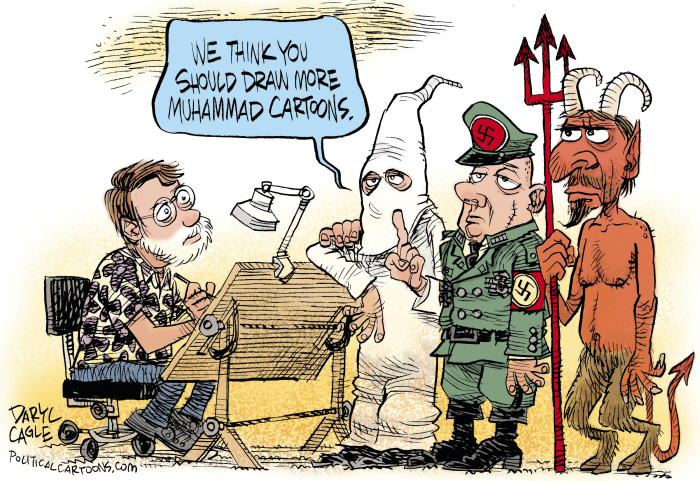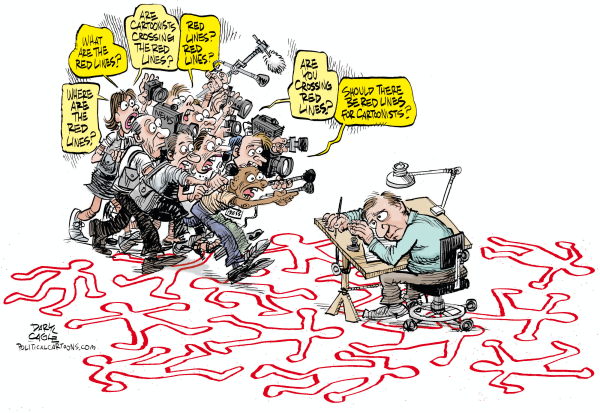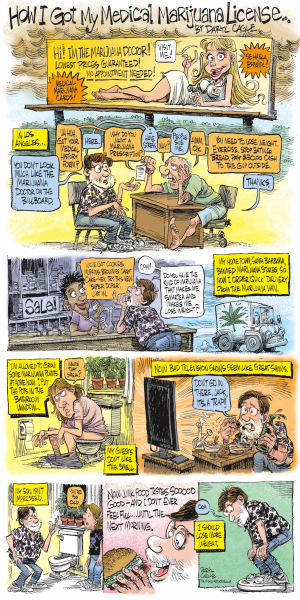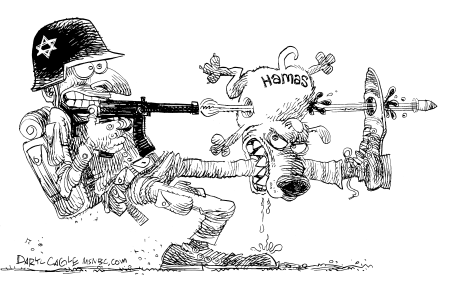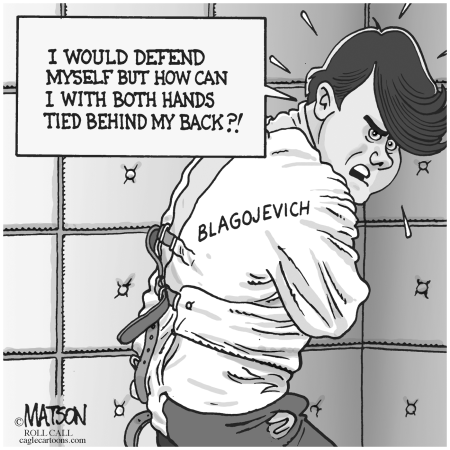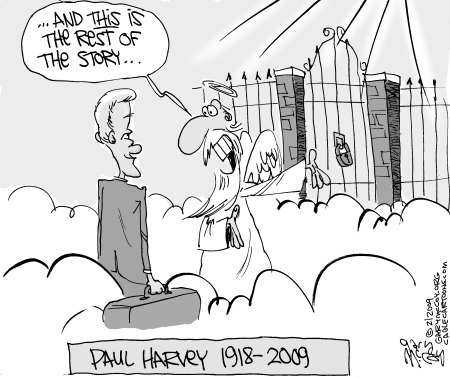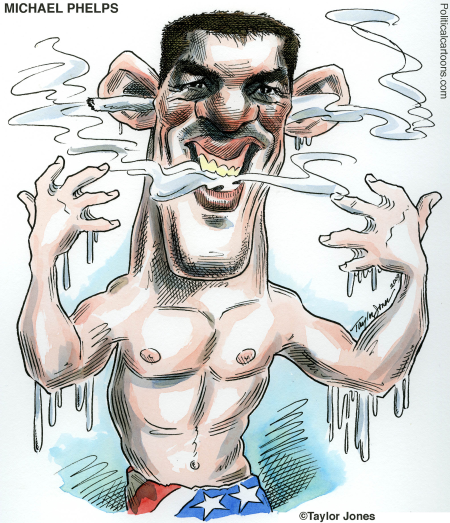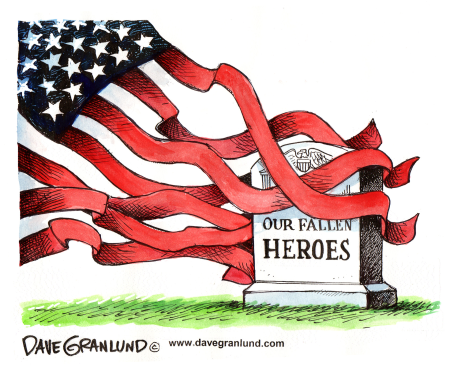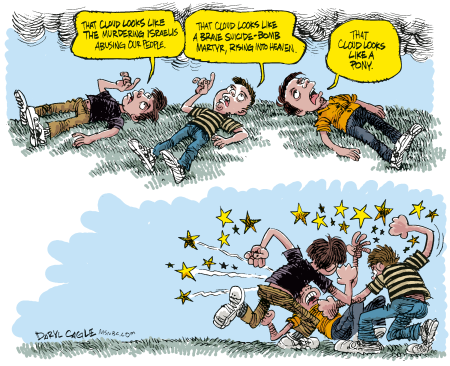
The conflict between Israel and the Palestinians still looms large in political cartoons around the world, with an endless flow of cartoons from Arab countries showing monster-Israel assaulting, eating, crushing or somehow decimating the poor Palestinians. The dove of peace has been killed by Israel in every imaginable cartoon — crushed, squeezed, stabbed, burned, eaten. Poor bird.
The conflict goes on forever, long after every original cartoon idea has been exhausted. Americans don’t see much of these cartoons because they would be regarded here as anti-Semitic at worst, or as the same thing over and over, at best.
I just got back from a speaking tour in Egypt, Israel and the Palestinian territories. At my first event in Cairo I spoke to a group of Egyptian journalists who brought a newspaper up to me, proudly pointing out that in Egypt, editorial cartoons are often printed big and in color on the front page of the newspaper. The cartoon they showed me would make an American editor choke; it showed a spitting snake, in the shape of a Star of David; inside the snake/star was a peace dove, trapped behind bars, and above the snake, in Arabic, were the words, “It’s not about the bird flu, it’s about the swine flu.”
I explained that in America this cartoon would be regarded as anti-Semitic, and it would never be printed. The Egyptian journalists were emphatic, explaining to me that the cartoon was about Israel, not about Jews — an important distinction to them.
“Israel isn’t mentioned anywhere in the cartoon,” I said.
“But we all know the Jewish star is the symbol of Israel,” they responded.
I said, “It is a religious symbol. It is the same as if I took the star and crescent off of the flag of Pakistan and drew a similar cartoon, saying it was about Pakistan.” The journalists didn’t respond to me, my comment was such nonsense. I continued, “This cartoon seems to say that Jews are snakes and pigs.”
“No, no! We have lots of symbols for Israel that we all know, like the Jew with black clothes and a big hooked nose!” one of the Egyptian journalists insisted with some passion. “We like Jews, we just don’t like Israel!” The Egyptian journalists all continued to insist that I misunderstood what the cartoon meant.
I later had an opportunity to meet with a group of Palestinian editorial cartoonists in Gaza by teleconference. I sympathize with their plight; the poor cartoonists had almost no outlets to print their cartoons. One of the Gaza cartoonists showed me a cartoon he was proud of, showing an alligator eating a dove. I told him I didn’t understand the cartoon, and he explained that the alligator was blue, “which everyone understands to be Israel” and the dove had green wings, “which everyone understands to be Palestine.”
I tried to come up with some advice for the Gaza cartoonists on how to get their work published. I suggested that they could submit their work to international publications, but that it would be tough if every cartoon was another Israel-monster cartoon. The cartoonists responded to say that in Gaza, they are under siege, and they don’t care to draw anything else.
I suggested that the Gaza cartoonists need to coax Western editors into printing their cartoons, and they would do well to consider some other angles; for example, drawing about their personal experiences and day-to-day difficulties. Palestinian cartoons criticizing Hamas and Fatah are rarely seen and would get reprinted.
I explained to the Gaza cartoonists that when the Israel/Palestine conflict is big in the news, and we post cartoons about the topic on our site, our Web site (www.cagle.com) traffic goes down. Americans are not very interested in events that happen outside of America, especially when it is the same news story, year after year. I told them that the most popular topic ever on our site was Janet Jackson’s boob, and that our readers really like cartoons about cute puppies. Hearing this, the Gaza cartoonists stared at me blankly, and then urged me to organize an international exhibition of cartoons that highlight their plight at the hands of Israel.
I spoke with one West Bank Palestinian cartoonist, Amer Shomali, who lost his gig with his newspaper because he insisted on drawing cartoons critical of Fatah; he was so frustrated that he rented a billboard to post a Fatah cartoon that his newspaper refused to publish. The billboard was swiftly taken down.
I met an excellent West Bank cartoonist, Khalil Abu Arafeh who draws for Al Quds, the big newspaper in the West Bank; he makes his living as an architect. Another talented West Bank cartoonist, Ramzy Taweel, breaks the Israel-monster cartoon mold, drawing about everyday life in the West Bank; his cartoons are seen only by his friends on his Facebook page. Ramzy could use some more Facebook friends; I encourage everyone to befriend him.
It is tough to make a living as a cartoonist anywhere these days — especially tough when the world has grown weary of what you want to say, when a market for your work doesn’t exist where you live, and when passions run high.
The fact that there is still a market for cartoons about cute puppies and cats who like lasagna probably doesn’t make the Palestinians feel any better.
Daryl Cagle is a political cartoonist and blogger for MSNBC.com; he is a past president of the National Cartoonists Society and his cartoons are syndicated to more than 850 newspapers, including the paper you are reading. Daryl’s books “The BIG Book of Campaign 2008 Political Cartoons” and “The Best Political Cartoons of the Year, 2010 Edition” are available in bookstores now.




